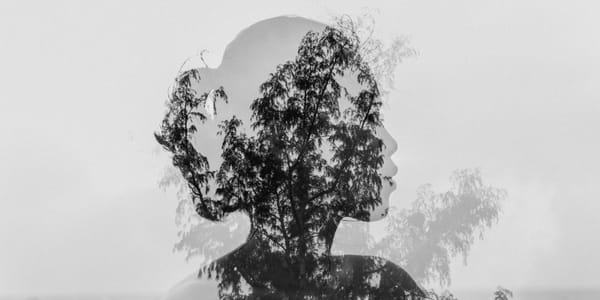Think about what happened this morning when you woke up in your bed. Did you ask for it, or did you just wake up? And then, did you initiate any special procedure to start breathing, heart beating, blood pumping, or seeing, hearing, feeling, and all the mental wobble? Did the sun need your permission to shine in the morning? In other words, is this all planned, under your control, or does it just happen spontaneously?
See, we fantasize about control because, in reality, there is no control. There is no need for control because this thing we call life is perfectly self-regulating. Control and the obsession with measuring everything is our play or little games within the play. In a way, we're indeed creative beings but also detached from reality, confusing the abstractions of reality we have created with reality.
For example, some, or rather most people, consider social life, that is, whatever humans do, from fundamental interactions to all the complications of banking, transportation, or politics, as the center of life. And since the most basic social institution is our ego, followed by our role in society and other nonsense about identity and stories, we tell each other, we end up with many unnecessary and unrelated, in fact illusory, life problems, e.g., whether it's punishment or a blessing.
The drama of life, or rather social life, happens upon a mutual agreement, a kind of unspoken taboo. Alan Watts once put it beautifully: "The most strongly enforced of all known taboos is the taboo against knowing who or what you really are behind the mask of your apparently separate, independent, and isolated ego.”
I have an image of "who I am," my ego, that I project through my persona to tell you "who I am," to participate in society and to realize my dreams and goals. You have your image, which you project through your persona. We tell each other stories and agree on the rules by which we play, from language and grammar to the most complex things like finance and politics. It reminds me of a quote I find funny by Menachem Mendel of Kotzk:
“If I am I, because you are you, and you are you, because I am I, then I am not I, and you are not you. But if I am I because I am I, and you are you because you are you, then I am I and you are you, and we can talk.”
I would change the word "talk" to "play" at the end of the quote, but it's still perfect. Anyway, in one way or another, human life is a drama—a never-ending drama—we've created to play with. Actually, it can be a thriller, a comedy, or even a tragedy. But none of these changes the fact that it's just a play because life happens spontaneously without any control, and ego is just a social institution, an illusory construct of our minds. All this nonsense about winning or losing, as well as questioning whether it's punishment or a blessing, is related only to social life or ego itself because life is just a spontaneous happening we experience.
But from the perspective of an ego, a perspective of involvement that might be pretty hard to swallow. Somehow, this constant compulsion to define life in extremes reflects the essence of human nature: our tendency to seek meaning and purpose. After all, from early childhood, we’re trained to assign value to everything and to evaluate experiences as desirable or undesirable. We grow up believing that life must be understood and categorized. But these categorizations, no matter how deep or philosophical, are our own abstractions—mental overlays on a vast, incomprehensible mystery that simply exists beyond our judgments.
To truly understand life, we must see it as it is, without imposing our abstract narratives onto it. Much like money, politics, or social status, the value of life doesn’t hinge on these mental constructs. These concepts, celebrated as pillars of our society, are just shared ideas. They’re symbols we invest in, games we play. Society tells us that these abstractions are “serious,” “meaningful,” or even “sacred,” but, like money, they’re merely tools we’ve invented to structure our world. Life, however, transcends all these invented meanings. It exists outside the bounds of what we call “serious” or “important,” defying our attempts to label it.
Consider the way we experience time. We often think of time as a race, a linear sequence marching toward a goal. This perception propels us through life in constant motion, endlessly chasing “more”—more money, more success, more accomplishments. But is life truly measured by accumulation? Or is this another abstraction we’ve imposed on the mystery of existence?
In truth, those who chase endlessly do not gain “more” life but merely stockpiling symbols that point to life. The material, the monetary, the honors—all these “achievements” are abstractions that ultimately mask a void that will never be filled by something so limited. In chasing symbols, we become blind to the simple act of being, the raw, unfiltered phenomenon of existing. We chase satisfaction and judge life by it, only to find that true satisfaction slips away the moment we try to hold it too tightly.
People with endless cravings for external validations—those who seek more money, power, or fame beyond what they need—are not necessarily “successful” in the grand sense, nor are they “blessed.” They’re simply trapped in a cycle of seeking fulfillment through illusions, trying to fill a void that can only be approached through the experience of simply being. These cravings are forms of suffering, born from the same place as our need to categorize life as a blessing or a punishment. They represent an urge to control what we don’t understand. But in the act of letting go, of seeing life as an experience rather than a possession, we may find a truer freedom.
So, perhaps the way forward is to embrace life as an ongoing, dynamic occurrence rather than an achievement or moral test. Life does not demand our approval. The sun does not need our permission to rise. We didn’t ask for the breath that fills our lungs or the heartbeat that carries us through the day. These things simply happen, guided by forces beyond our grasp. Our role, then, is not to judge them but to join them—to engage in the act of experiencing without the need to define, control, or claim.
Life is a phenomenon, not a blessing or a curse, and its beauty lies in this simple, inexplicable fact. By learning to live without labels and freeing ourselves from the abstractions we so easily cling to, we can find the true essence of life: an experience that asks nothing of us but to experience it. In this way, life does not need to be good, bad, important, or trivial. It simply is, and that is more than enough.







